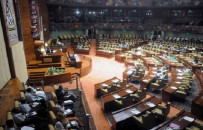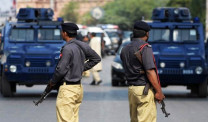Omicron feared to loom within mosques
'One of main reasons is people who have been vaccinated think that they are now safe from the virus'

As Omicron cases begin to pile and the city gambles with its fifth coronavirus wave, Karachi’s mosques continue to remain a potential hotspot for the next viral spread. Owing to abandonment of state-prescribed precautionary measures including social distancing and use of facemasks, in addition to lack of screening for vaccinated and unvaccinated persons, experts fear that uncontrolled congregations at places of worship could catalyse another viral outbreak.
Although the provincial government acknowledges the contribution of ulemas and mosque committees in controlling Covid-19 during early pandemic stages, it also believes that a much higher level of corporation is required this time around; to keep Omicron from gaining momentum.
Per orders issued by the Sindh Home Department at the behest of the National Command and Operation Centre (NCOC), unvaccinated persons are to no longer be allowed within mosques, while all mosques are to remove carpeting from their premises.
However, none of that seems to have had any effect on the operations of local mosques, where most mosque committees have turned a blind-eye to the virus at large, letting worshippers go unchecked, unmasked and unvaccinated.
Addressing the issue, Haji Saif, a local mosque committee member from Liaquatabad, said that it was the drop in Covid-19 numbers in the last few months that encouraged mosques to relax their anti-coronavirus restrictions.
“It is true that sanitisation gates and thermal guns have been removed from most mosque entrances, in addition to missing sanitisers from ablution areas. Worshippers don’t adhere to social distancing or wearing a facemask anymore. One of the main reasons for this is that people who have been vaccinated think that they are now safe from the virus and the general impression is that the pandemic has died down in Karachi,” he corroborated.
Similarly, Nadeem Akhtar, administrator of another local mosque, also maintained that the relaxation of SOPs in places of worship is tied to the relaxation in enforcement of SOPs by the government itself. “People don’t wear masks or observe social distancing on the streets, busses or public spaces, now that a majority are vaccinated. So they don’t feel the need to do that at mosques either,” the administrator Talking about the home department’s latest order however, Akhtar said that it is an entirely unviable option.
Read More: Balochistan reports 30 suspected cases of Omicron variant
He believes that it would be impossible for mosque committees to screen worshippers and close forcibly close doors for unvaccinated persons. “This would create an unnecessary mess but if the government still wants to stop people, it can do it on its own. But if it instead considers consulting local scholars and draft a more applicable policy, then there might be some chances of fixing this,” he added.
On the other hand, Sultan Akbar, who is a committee member at a Kemari mosque, commended the government’s decision directing mosques to immediately remove all carpeting. “This is something doable and would also make it easier to maintain cleanliness on a daily basis,” he opined.
According to prayer leader Imam Hafiz Muhammad Yasir however, now that a fifth wave is feared, mosques have started re-enforcing SOPs that had previously been relaxed. He shared that most mosques in the city have already removed all carpeting and have started spraying disinfect at least twice a day, while prescribing social distancing to worshippers. “The sanitiser gates will also be reactivated if necessary and the clergy, in consultation with the government, will leave no stone unturned in implementing all Covid-19 SOPs,” he conveyed.
Agreeing to which, Special Assistant to Chief Minister Sindh Waqar Mehdi also maintained that the provincial government has started arrangements to contain the fifth wave of coronavirus.
“We are ready to collaborate with the ulema and mosque committees to awareness campaigns and encourage people get vaccinated, and we are confident that all precautions will be fully implemented in the light of NCOC guidelines,” he told The Express Tribune.
Published in The Express Tribune, January 1st, 2022.



















COMMENTS
Comments are moderated and generally will be posted if they are on-topic and not abusive.
For more information, please see our Comments FAQ